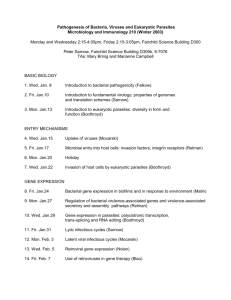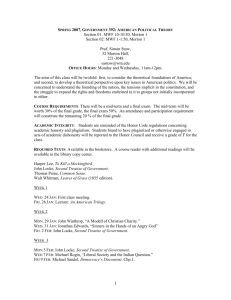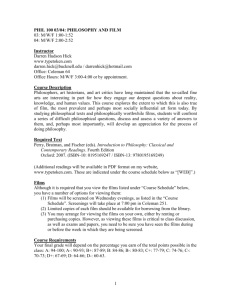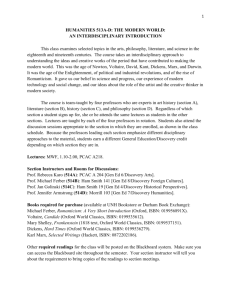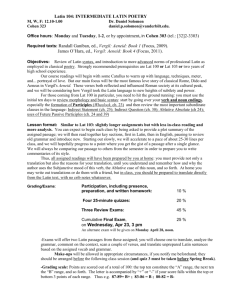Sam Potolicchio
advertisement
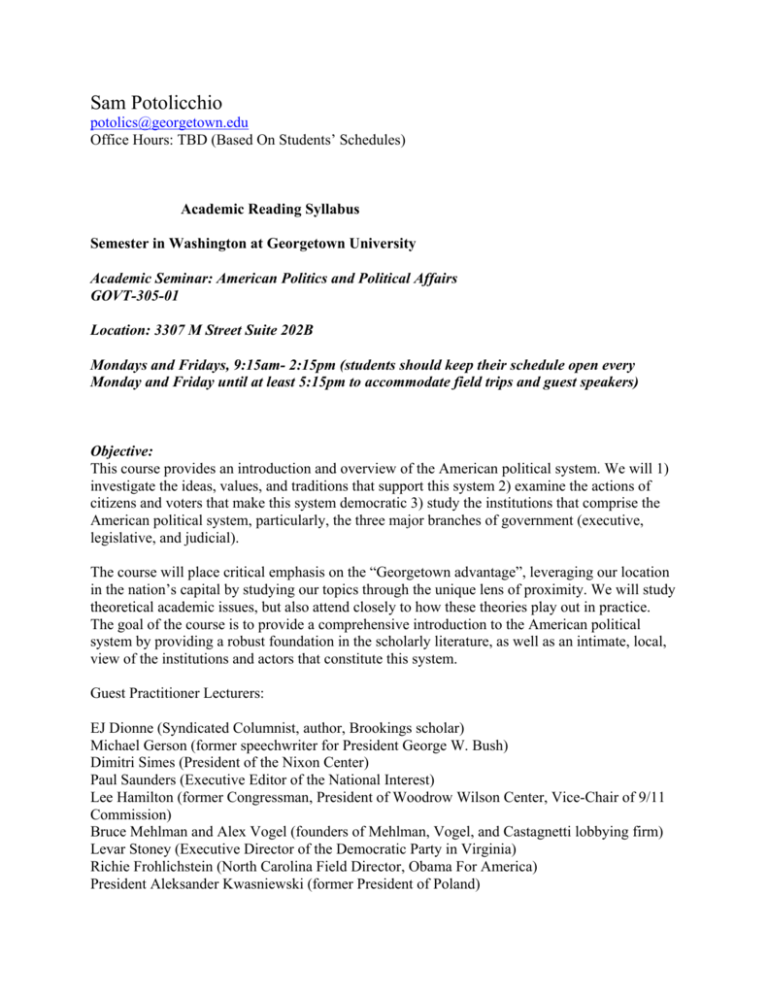
Sam Potolicchio potolics@georgetown.edu Office Hours: TBD (Based On Students’ Schedules) Academic Reading Syllabus Semester in Washington at Georgetown University Academic Seminar: American Politics and Political Affairs GOVT-305-01 Location: 3307 M Street Suite 202B Mondays and Fridays, 9:15am- 2:15pm (students should keep their schedule open every Monday and Friday until at least 5:15pm to accommodate field trips and guest speakers) Objective: This course provides an introduction and overview of the American political system. We will 1) investigate the ideas, values, and traditions that support this system 2) examine the actions of citizens and voters that make this system democratic 3) study the institutions that comprise the American political system, particularly, the three major branches of government (executive, legislative, and judicial). The course will place critical emphasis on the “Georgetown advantage”, leveraging our location in the nation’s capital by studying our topics through the unique lens of proximity. We will study theoretical academic issues, but also attend closely to how these theories play out in practice. The goal of the course is to provide a comprehensive introduction to the American political system by providing a robust foundation in the scholarly literature, as well as an intimate, local, view of the institutions and actors that constitute this system. Guest Practitioner Lecturers: EJ Dionne (Syndicated Columnist, author, Brookings scholar) Michael Gerson (former speechwriter for President George W. Bush) Dimitri Simes (President of the Nixon Center) Paul Saunders (Executive Editor of the National Interest) Lee Hamilton (former Congressman, President of Woodrow Wilson Center, Vice-Chair of 9/11 Commission) Bruce Mehlman and Alex Vogel (founders of Mehlman, Vogel, and Castagnetti lobbying firm) Levar Stoney (Executive Director of the Democratic Party in Virginia) Richie Frohlichstein (North Carolina Field Director, Obama For America) President Aleksander Kwasniewski (former President of Poland) President Jose Maria Aznar (former President of Spain) John O’Keefe (former Ambassador to Kyrgyzstan) Robert Reilly (former President of Voice of America) Ken Mehlman (former Chairman of the National Republican Party and Campaign Manager for President George W. Bush’s Re-election Campaign) Spencer Abraham (former Secretary of Energy and former Senator from Michigan) Tucker Carlson (former host of Crossfire and Tucker, founder of the Daily Caller) Tom Tamm (Justice lawyer and Newsweek cover man) Partners at Hart and Lake Research (two of the nation’s leading poll firms) John Yoo (legal advisor to President Bush) Roger Pilon (Chairman, Constitutional Studies at Cato) Guest Lecturer Scholars of Political Science Stephen Wayne (http://explore.georgetown.edu/people/waynes/?PageTemplateID=156) Michael Bailey (http://www9.georgetown.edu/faculty/baileyma/) Marc Howard (http://explore.georgetown.edu/people/mmh/?PageTemplateID=156) Clyde Wilcox (https://www9.georgetown.edu/faculty/wilcoxc) We will cover the following topics: The Constitution and Federalism (Jan. 13th, 15th and 22nd) Public Opinion (Jan. 25th and Jan. 29th) The Presidency (Feb. 1, Feb. 5, Feb. 8, Feb 12) Campaigns and Elections (Feb. 19) Congress (Feb. 22 and Feb. 26) Judiciary (March 1st and March 5) Political Parties (March 15 and March 19) Political Interest Groups (March 22 and March 26) Religion and Politics (April 9) Political Communication (April 12 and April 16) Media and Politics (April 19th) Domestic Policy-making (April 23) International and National Security Policy (April 26) Required Texts: Please purchase #1-4 at amazon.com or a suitable online discount vendor so to minimize cost. You should be able to purchase all 4 books for well under 50 dollars (combined). 1. Conflict and Consensus in American Politics. (2009) Wayne/Mackenzie/Cole (Textbook) * You may purchase an earlier edition to reduce cost. Half.com has 5 copies available for under 4 dollars of the 2006 edition. 2. 3. 4. 5. The Choices Justices Make (1997) Epstein Why Parties? The Origin and Transformation of Political Parties in America Aldrich The Presidency in A Separated System (2005) Jones www.realclearpolitics.com (1995) Course Requirements: BOOK REVIEW (10%) The three-page book review will accomplish the following objectives; 1) concisely reprise the basic argument or narrative of the book 2) contextualize the book within the literature of political science 3) critique and analyze the argument or narrative 4) discuss how the book contributes to our understanding of the American political system. SIMULATION (10%) This assignment provides a simulated interplay of the American political system. Students will be assigned different roles (Supreme Court justices, Senators, members of the House of Representatives, the President, op-ed columnists, aspiring presidential candidates, Governors etc). Each actor will then take a stance on an assigned issue prompt and write a two-age argument defending this stance. PRESIDENTIAL MEMO (20%) Each student will write a 5 pg memo to the President of the United States on a contested political issue. The memo will accomplish the following 1) outline the importance of the political issue 2) discuss why this issue is important to the President 3) survey the academic literature and political landscape 4) propose a course of action for the President. SCHOLARLY RECITATION (10%) This course will introduce students to the scholarly literature of political science with a particular emphasis on methodological debates and issues. Each week’s readings will include scholarly articles on the topic from prominent political science journals. Each student will be responsible for leading (3) class discussions on these articles. The articles are designed to address both practice and theory, but more importantly, they are to spur the student to think critically about political science. CLASS DEBATE/DISCUSSION (20%) Each student will be expected to engage in our classroom discussions and debates. We will frequently debate an important contemporary issue as dictated by the news agenda and our weekly reading from www.realclearpolitics.com SPEAKER Q/A (10%) Using the “Georgetown advantage” the course will introduce students to significant political and academic practitioners. Part of excelling in both political science and politics requires students to engage actively in the discussion. Students will be expected to ask appropriate and provoking questions of their guest lecturers. Scheduled lecturers include federal elected officials, national editors, prominent non-profit leaders, preeminent academics, campaign strategists and national pundits. FINAL EXAM (20%) There will be a final comprehensive exam on content from class lectures and the reading assignments. TENATIVE READING SCHEDULE While the textbook reading and purchased texts are fixed in the reading schedule, please be advised that the scholarly articles will adapt to student interests and by assignments given by our many guest speakers as the semester progresses. ****Only the first two weeks of the readings are set (thru Jan.22nd), and I have provided links to these documents. Mon Jan 18 MLK HOLIDAY 1. Wed Jan 13 2. Fri Jan 15 The Constitution of The United States of America http://www.constituti on.org/constit_.htm “Federalism, Nationalism, and Democracy in America” Beer (APSR 1978) http://apsanet3b.inetu.net/m edia/PDFs/PresidentialAddr esses/1977AddrBEER.pdf Wed Jan 20 Research Seminar 3. Fri Jan 22 Textbook (Chapter 2) “Issues of Federalism In Response to Terrorism” Kincaid and Cole (Public Administration Review 2002) http://mavdisk.mnsu.edu/pa rsnk/2008-9/POL%20680Fall/documents/POL%2068 0%20readings/federalism- wk%202/federalism%20and %20response%20to%20terr or.pdf “Balancing Regionalism and Localism: How Institutions and Incentives Shape American Transportation Policy” Gerber and Gibson (AJPS 2009) https://harrisschool.uchicag o.edu/Programs/beyond/wor kshops/pol_econ_papers/spr ing08-gerber.pdf “Towards A Progressive Politics and A Progressive Constitution” Becker (Fordham Law Review 2001) http://law2.fordham.edu/pu blications/articles/500flspub 11607.pdf “The United States Constitution: From Limited Government to Leviathan” Roger Pilon (Economic Education Bulletin 2005) http://www.cato.org/pubs/ar ticles/CT05.pdf 4. Mon Jan 25 Textbook (Chapter 5) “Mass Political Attitudes and the Survey Response” Achen (APSR 1975) Wed Jan 27 Research Seminar 5. Fri Jan 29 “Issue Frames and GroupCentrism in American Public Opinion” Nelson and Kinder (JOP 1996) “Politics Across Generations: Family Transmission Re-examined” Jennings, Stoker, and Bowers (JOP 2009) “No More Wilder Effect, Never A Whitman Effect: When and Why Polls Mislead About Black and Female Candidates” Hopkins (JOP 2009) 6. Mon Feb 1 Wed Feb 3 Research Seminar Textbook (Chapter 11) 8. Mon Feb 8 “Presidential Saber Rattling and The Economy” Wood (JOP 2009) 7. Fri Feb 5 Presidency In A Separated System, Jones (2005) Wed Feb 10 Research Seminar 9. Fri Feb 12 BOOK REVIEW DUE “Political Prowess or ‘Lady Luck’ Evaluating Chief Executives’ Legislative Success Rates” Saiegh (JOP 2009) Mon Feb 15 (Federal/university holiday) Wed Feb 17 Research Seminar 10. Fri Feb 19 Textbook Chapter (8) “Do The Advantages of Incumbency Advantage Incumbents” Gordon and Landa (JOP 2009) “The Election Implications of Candidate Ambiguity” Tomz and Van Houling (AJPS 2009) “Does Gerrymandering Cause Polarization?” McCarty, Poole and Rosenthal (AJPS 2009) 11. Mon Feb 22 Textbook (Chapter 10) US Members In Their Constituencies, Fenno APSR (1977) 13. Mon Mar 1 Textbook (Chapter 13) Wed Research Seminar Feb 24 Wed Mar 3 Research Seminar The Choices Justices Make, Epstein (1997) Mon Mar 8 SPRING BREAK 15. Mon Mar 15 Textbook (Chapter 7) Why Parties? The Origin and Transformation of Political Parties in America, Aldrich (1995) Wed Mar 10 SPRING BREAK Wed Mar 17 Research Seminar 12. Fri Feb 26 “Delegates or Trustees? A Theory of Political Accountability” Fox and Shotts (JOP 2009) “The Dynamics of Partisan Conflict on Congressional Approval” Ramirez (AJPS 2009) 14. Fri Mar 5 “Agenda Setting on The Supreme Court: The Collision of Policy and Jurisprudence” Black and Owens (JOP 2009) “New Style Judicial Campaigns and The Legitimacy of State High Courts” Gibson (JOP 2009) Fri Mar 12 SPRING BREAK 16. Fri Mar 19 “The Participatory Effect of Redistricting” Hayes and McKee (AJPS 2009) “Source Cues, Partisan Identities, and Political Value Expression” Goren, Federico, Kittilison (AJPS 2009) 17. Mon Mar 22 Textbook (Chapter 6) Wed Mar 24 “The Origins and Maintenance of Interest Groups in America” Walker (APSR 1983) “Lobbying and Taxes” Richter (AJPS 2009) 18. Fri Mar 26 “Educating The Least Informed: Group Endorsements In A Grassroots Campaign” Arceneux (AJPS 2009) “Interest Group Competition and Coalition Formation” Holyoke (AJPS 2009) Fri Apr 2 EASTER BREAK 19. Mon Mar 29 SIMULATION DUE Wed Mar 31 Mon Apr 5 EASTER BREAK Wed Apr 7 20. Fri Apr 9 Selections from “Onward Christian Soldiers” Wilcox, “Religion and Politics in America” Wald, and “Souled Out,” Dionne 21. Mon Apr 12 Selections from “The Rhetorical Presidency” Tulis Wed Apr 14 22. Fri Apr 16 Selections from “The Presidency in the era of 24 Hour News” Cohen 23. Mon Apr 19 Textbook (Chapter 9) Wed Apr 21 24. Fri Apr 23 Textbook (Chapter 14) 25. Mon Apr 26 Wed Apr 28 26. Fri April 30 PRESIDENTIAL MEMO DUE Wed May 5 EXAMINATIONS Wed May 12 Fri May 7 EXAMINATIONS Sat May 15 COMMENCEMENT Textbook (Chapter 15) Mon May 3 EXAMINATIONS Mon May 10 EXAMS END ATTENDANCE POLICY SWP student attendance is expected at all meetings of your course. Unexcused tardiness is not acceptable and may result in a lower final grade as an indication of a lack of class participation. If a student misses more than two class sessions, the Assistant Dean will be contacted regarding the appropriate action to be taken. DISABILITY POLICY Students with Disabilities Students with disabilities should contact the Academic Resource Center (Leavey Center, Suite 335; 202-687-8354; arc@georgetown.edu; http://ldss.georgetown.edu/index.cfm) before the start of classes to allow their office time to review the documentation and make recommendations for appropriate accommodations. If accommodations are recommended, you will be given a letter from ARC to share with your professors. You are personally responsible for completing this process officially and in a timely manner. Neither accommodations nor exceptions to policies can be permitted to students who have not completed this process in advance. HONOR CODE The Georgetown Honor System: All students are required to abide by the Honor System and Code regardless of whether or not they have been required to state or write it. The Honor System includes detailed provisions for investigating and adjudicating allegations of academic misconduct. Further information is available at http://gervaseprograms.georgetown.edu/hc/. Students found to have committed any such offense will be subject to academic penalties. These include but are not limited to failure of the course, suspension or dismissal from the University, and revocation of degrees already conferred. GRADING SCALE Students will be given numerical grades for their various assignments. These numerical grades, when added up to form their final grades, will be converted into letter grades according to the following scale: 93-100 A 90-92 A88-89 B+ 83-87 B 80-82 B78-79 C+ 73-77 C 70-72 C68-69 D+ 63-67 D 60-62 Dunder 60 F LATE SUBMISSIONS AND INCOMPLETES Unless otherwise approved by the instructor, late submissions will be penalized 10% for each day beyond the deadline. Incompletes in the course must be approved by both the instructor and the Assistant Dean. UPDATED SYLLABUS Students will, on occasion, receive via email an updated syllabus from the instructor as we tailor the class readings to fit students’ interests and as our speakers assign readings. CITATIONS Students are expected to use generally accepted citation systems, e.g. APA style, MLA style.



